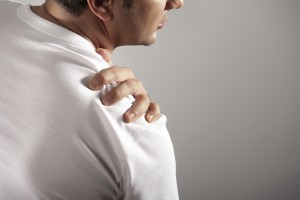 Unlike the hip’s deeper ball and socket joint, the shoulder joint’s socket is shallow and prone to injury. To compensate for such a shallow socket, the shoulder joint has a cuff of cartilage called the labrum, which deepens the socket (called the glenoid) and makes it more stable and movable. The labrum cartilage forms a cup at the end of the humerous (the upper arm bone).
Unlike the hip’s deeper ball and socket joint, the shoulder joint’s socket is shallow and prone to injury. To compensate for such a shallow socket, the shoulder joint has a cuff of cartilage called the labrum, which deepens the socket (called the glenoid) and makes it more stable and movable. The labrum cartilage forms a cup at the end of the humerous (the upper arm bone).
When a person suffers shoulder trauma, it is possible for the labrum to tear. Read on to learn more about labral tear injuries, their risk factors, symptoms, types, diagnosis and treatment.
Labral Tear Causes and Risk Factors
The labrum is a complex network of tissues that can become more brittle and weak with age. As a result, the aging process can make people more prone to labral tears. Furthermore, when traumatic injury affects the shoulder—as with vehicle accidents, falls, and other accidents—a labral tear can also occur, alone or in conjunction with other injuries.
Symptoms of Labral Tear
Symptoms of a labral tear depend on the location of the tear, but this injury often causes:
- A feeling that the shoulder is “catching” with activity
- Pain that worsens with certain movements
- An aching feeling in the shoulder
Some labral tears (such as the Bankart lesion) may a person more susceptible to accompanying shoulder dislocation, which has its own symptoms.
Common Types of Labral Tears
- Bankart Lesions: This tear occurs when the shoulder dislocates.
- SLAP tears: This tear occurs at the top of the shoulder socket where the tendon of the biceps attaches to the shoulder. Athletes that make overhead throwing motions are susceptible to this type of tear.
- Posterior labral tears: With this injury the rotator cuff and the labrum are pinched together at the back of the shoulder, causing a condition called internal impingement.
Labral Tear Treatment
Treatment for a labral tear will depend on the nature and extent of the tear. In most cases, surgery is not necessary to treat the tear. Yet, cases of labral tear that do not respond to non-surgical treatments may require surgical treatment.
New York and New Jersey Labrum Injury Attorneys
Our New York and New Jersey labral tear injury lawyers want to help you or a loved one seek the compensation you deserve. The Oshman Firm has over 35 years of personal injury legal experience. Call us today at (800) 400-8182 or fill our our FREE consultation form if you or a loved one has been hurt due to the negligence of another.
